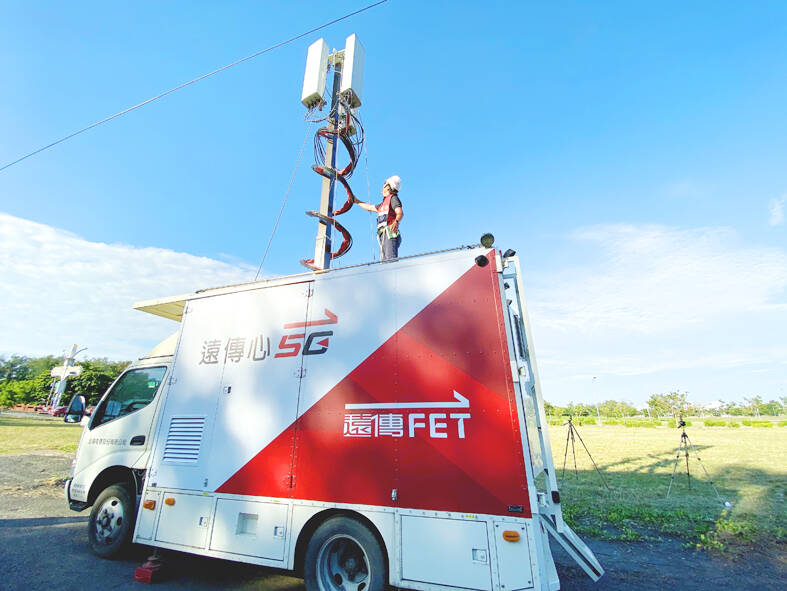Far EasTone Telecommunications Co (遠傳電信) yesterday said it is seeking to decommission at least 5,000 base stations using overlapping frequency bands with Asia Pacific Telecom Co (亞太電信) following the acquisition of the smaller telecom.
Far EasTone president Chee Ching (井琪) made the remarks on the sidelines of a forum in Taipei.
With those base stations going offline, Far EasTone would reduce carbon emissions by about 25,000 tonnes annually, Ching said.

Photo courtesy of Far EasTone Telecommunications Co
About 92 percent of Asia Pacific Telecom base stations can be integrated with the ones operated by Far EasTone, the company said.
Far EasTone is likely to scrap another 12,000 3G base stations, as a timeframe set by the National Communications Commission stipulates that 3G networks be shut down next year.
Commission data show that each telecom would reduce their electricity use by up to 100 million kilowatt-hours per year by shutting down 3G stations.
Far EasTone said that base stations contribute 75 percent to its power consumption, so reducing their number would contribute greatly to its electricity saving plans.
Data centers and servers account for 23 percent of power consumption, while office buildings and retail stores account for 2 percent, it said.
Far EasTone expects to complete the merger with Asia Pacific Telecom as early as the third quarter of this year, saying that it would create NT$3 billion (US$98.3 million) in synergy benefits within one year of the merger.
Most of the benefits would come from cost saving measures through integrating the two base station ecosystems and spectrum sharing, it said.
The merger is subject to approval by the Fair Trade Commission, after the National Communications Commission conditionally approved the deal in the middle of January.

MULTIFACETED: A task force has analyzed possible scenarios and created responses to assist domestic industries in dealing with US tariffs, the economics minister said The Executive Yuan is tomorrow to announce countermeasures to US President Donald Trump’s planned reciprocal tariffs, although the details of the plan would not be made public until Monday next week, Minister of Economic Affairs J.W. Kuo (郭智輝) said yesterday. The Cabinet established an economic and trade task force in November last year to deal with US trade and tariff related issues, Kuo told reporters outside the legislature in Taipei. The task force has been analyzing and evaluating all kinds of scenarios to identify suitable responses and determine how best to assist domestic industries in managing the effects of Trump’s tariffs, he

TIGHT-LIPPED: UMC said it had no merger plans at the moment, after Nikkei Asia reported that the firm and GlobalFoundries were considering restarting merger talks United Microelectronics Corp (UMC, 聯電), the world’s No. 4 contract chipmaker, yesterday launched a new US$5 billion 12-inch chip factory in Singapore as part of its latest effort to diversify its manufacturing footprint amid growing geopolitical risks. The new factory, adjacent to UMC’s existing Singapore fab in the Pasir Res Wafer Fab Park, is scheduled to enter volume production next year, utilizing mature 22-nanometer and 28-nanometer process technologies, UMC said in a statement. The company plans to invest US$5 billion during the first phase of the new fab, which would have an installed capacity of 30,000 12-inch wafers per month, it said. The

Taiwan’s official purchasing managers’ index (PMI) last month rose 0.2 percentage points to 54.2, in a second consecutive month of expansion, thanks to front-loading demand intended to avoid potential US tariff hikes, the Chung-Hua Institution for Economic Research (CIER, 中華經濟研究院) said yesterday. While short-term demand appeared robust, uncertainties rose due to US President Donald Trump’s unpredictable trade policy, CIER president Lien Hsien-ming (連賢明) told a news conference in Taipei. Taiwan’s economy this year would be characterized by high-level fluctuations and the volatility would be wilder than most expect, Lien said Demand for electronics, particularly semiconductors, continues to benefit from US technology giants’ effort

‘SWASTICAR’: Tesla CEO Elon Musk’s close association with Donald Trump has prompted opponents to brand him a ‘Nazi’ and resulted in a dramatic drop in sales Demonstrators descended on Tesla Inc dealerships across the US, and in Europe and Canada on Saturday to protest company chief Elon Musk, who has amassed extraordinary power as a top adviser to US President Donald Trump. Waving signs with messages such as “Musk is stealing our money” and “Reclaim our country,” the protests largely took place peacefully following fiery episodes of vandalism on Tesla vehicles, dealerships and other facilities in recent weeks that US officials have denounced as terrorism. Hundreds rallied on Saturday outside the Tesla dealership in Manhattan. Some blasted Musk, the world’s richest man, while others demanded the shuttering of his